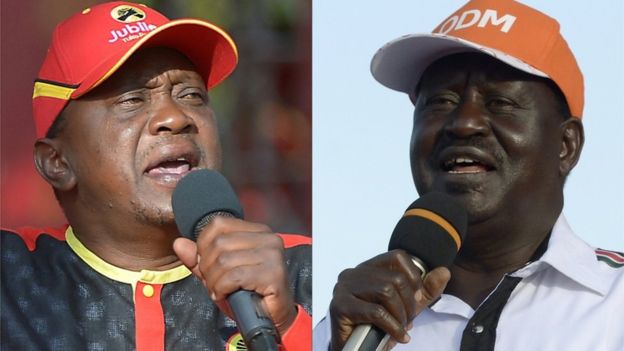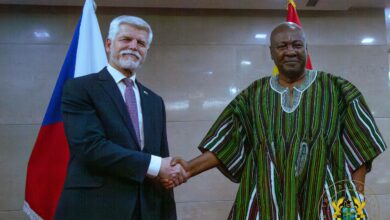
People are voting in Kenya’s general election amid fears that the result could trigger communal violence.
On the eve of the vote, President Uhuru Kenyatta appealed for calm in a televised speech.
He urged the 19 million registered voters to turn out in great numbers, but “in peace”. Queues formed early and some minor stampedes were reported.
The contest pits Mr Kenyatta against his long-time rival, Raila Odinga, and is seen as too close to call.
Mr Kenyatta, the 55-year-old son of Kenya’s founding president, is seeking a second and final term in office.
The final week of campaigning has been marred by the murder of a top election official and claims of vote-rigging.
- Live updates from the polls
- Kenyatta: The digital president
- Odinga: Love him or loathe him
- Full elections coverage
Observers say the leading candidates both avoided inflammatory speeches as polling day drew closer. In 2007 more than 1,100 Kenyans died and 600,000 were displaced after a disputed election – an outcome neither side wants to see repeated.
This time long snaking queues were seen at some polling stations, and video footage at one showed people injured on the ground after an apparent stampede.
Some polling stations opened late, the electoral commission said on Twitter.
“We are addressing these concerns,” it added. “Will ensure that no single voter is disenfranchised”.
On Monday, Mr Kenyatta urged voters to go home after casting their ballots.
“Go back to your neighbour, regardless of where he or she comes from, their tribe, their colour or their religion,” he said.
“Shake their hand, share a meal and tell them ‘let us wait for the results,’ for Kenya will be here long after this general election.”
Opposition leader Mr Odinga, of the National Super Alliance, also addressed the public on Monday. He raised fears about vote-rigging and claimed the deployment of at least 150,000 members of the security forces was a ploy to intimidate voters.
However, he congratulated Mr Kenyatta on his campaign, describing him as a “worthy opponent”.
“May the stronger candidate win tomorrow,” he said.
A complex vote
By Dickens Olewe, BBC News, Nairobi
In Westlands Primary School polling station in the capital, Nairobi, where I voted, people started queuing from as early as 02:00 local time (23:00 GMT).
When the gates did not open at 06:00 as scheduled, some people became agitated and some approached journalists to vent their frustrations.
The gates opened at 06:23 and the already impatient crowd broke from their orderly queue to rush into the school compound.
Once in, they stood in different queues that had been set up based on voters’ surnames.
To verify voters’ details, the Independent Electoral and Boundaries Commission ( IEBC) is using an integrated voting system.
I found myself in the wrong queue so my biometric details were not available in the unique machine used in that stream.
The officials proceeded to punch my ID number manually into the machine which brought up my details.
After getting into the right queue, my biometric details were verified and my photo and name were displayed on the machine in a few seconds.
I was then handed six ballot papers and proceeded to the voting booth.
After I voted, my finger was marked with indelible ink. The whole process took about four minutes.
Despite delays and some confusion, the enthusiasm and energy is unmistakable.
Kenyans take pride in voting and their only hope today is that the voting machines work and do not fail as they did in 2013.
Former US President Barack Obama, whose father was born in Kenya, also called for calm.
“The choices you make in the coming days can either set Kenya back or bring it together,” he said in a statement.
“As a friend of the Kenyan people, I urge you to work for a future defined not by fear and division, but by unity and hope.”
Eight presidential candidates are on the ballot on Tuesday, with polls open until 17:00 local time (14:00 GMT).
Kenya’s election in numbers:
- Six separate ballot papers: For president, national assembly, female representatives, governors, senate and county assemblies
- 47 parliamentary seats and 16 senate seats reserved for women
- Eight presidential candidates: President Uhuru Kenyatta and opposition leader Raila Odinga are favourites
- Kenyatta beat Odinga in 2013 – their fathers were also political rivals in the 1960s
- A candidate needs 50% plus one vote for first-round victory
- More than 14,000 candidates running across the six elections
- More than 45% of registered voters under 35
- Some 180,000 security officers on duty nationwide in case of trouble
Vote strains mixed ethnicity marriages
What first-time voters make of it all
To win outright, a candidate needs 50% plus one vote, and at least 25% of the votes in 24 of Kenya’s 47 counties.
If that threshold is not met it will trigger a run-off vote between the top two candidates, with the winner requiring a simple majority.
First results are not expected before Wednesday, but if the race is close it could take three days for a winner to emerge.
Voters are also choosing lawmakers, senators, governors, county officials and women’s representatives. More than 14,000 candidates are standing in those elections.
Fourth time lucky?
Mr Odinga, 72, has run for president three times and lost each time. President Kenyatta beat him in the last election in 2013, but their rivalry is generations old – their fathers were political opponents in the 1960s.
Mr Kenyatta and his running-mate William Ruto were indicted by the International Criminal Court for their alleged roles in the bloodshed a decade ago. The case ultimately collapsed due to lack of evidence, and after key witnesses died or disappeared.
Hate speech flyers and rhetorical text messages have been circulating, making Kenyans nervous. Some are stockpiling food and water while police have prepared emergency first aid kits.
Some families have travelled from the capital, Nairobi, to their ethnic heartlands over fears of violence.
Writing from Nairobi, the BBC’s Alastair Leithead says what happens after the election is less about who wins and more about how those who lose take their defeat.
The success of the country’s computerised voting system is key to the process being considered free and fair.
If it fails – as it did in 2013 – the votes will be counted manually and the loser will no doubt challenge the result.
Source: BBC



